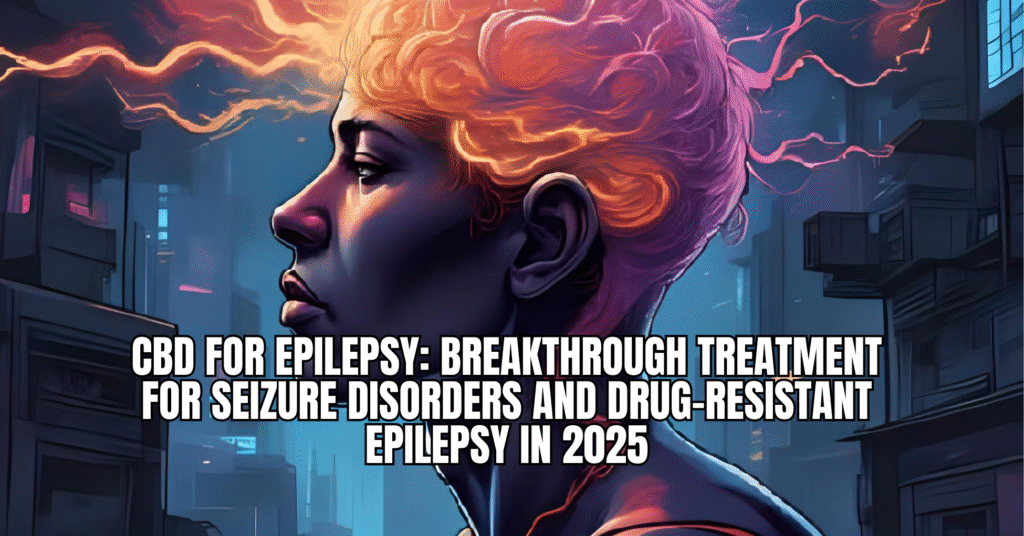Epilepsy affects over 3 million Americans, with nearly one-third experiencing drug-resistant seizures that don’t respond to traditional medications. CBD for epilepsy has revolutionized seizure treatment, leading to the first FDA-approved cannabis-derived medication, Epidiolex. This comprehensive guide explores how medical cannabis and CBD are transforming epilepsy care, offering new hope for patients with treatment-resistant seizures.
Table of Contents
- Understanding CBD and Epilepsy Treatment
- FDA-Approved Epidiolex for Seizure Disorders
- How CBD Controls Seizures
- Cannabis for Specific Epilepsy Syndromes
- CBD vs Traditional Anti-Seizure Medications
- Dosing CBD for Seizure Control
- Charlotte’s Web and High-CBD Strains
- Safety and Side Effects in Epilepsy Patients
- Legal Access and Insurance Coverage
- Frequently Asked Questions
Understanding CBD and Epilepsy Treatment
CBD epilepsy treatment represents one of medical cannabis’s most significant breakthroughs. Cannabidiol (CBD) demonstrates remarkable anti-seizure properties through multiple neurological mechanisms, offering hope for patients with drug-resistant epilepsy who have exhausted traditional treatment options.
Medical marijuana for seizures, particularly high-CBD, low-THC formulations, can reduce seizure frequency by 50% or more in many patients. This dramatic improvement often occurs when conventional anti-epileptic drugs (AEDs) have failed, making CBD a game-changing addition to epilepsy treatment protocols.
The success of CBD in treating pediatric epilepsy has been particularly notable, with some children experiencing complete seizure freedom after years of daily seizures that severely impacted their development and quality of life.
FDA-Approved Epidiolex for Seizure Disorders
Epidiolex represents a landmark achievement in cannabis medicine as the first FDA-approved medication derived from cannabis. This pharmaceutical-grade CBD solution is approved for:
Lennox-Gastaut Syndrome (LGS): A severe form of childhood epilepsy characterized by multiple seizure types and developmental delays.
Dravet Syndrome: A rare, severe form of epilepsy beginning in infancy, often featuring prolonged, frequent seizures.
Tuberous Sclerosis Complex (TSC): A genetic disorder causing benign tumors and associated seizures.
Epidiolex Clinical Results:
- 39-42% reduction in seizure frequency in clinical trials
- Some patients achieved complete seizure freedom
- Significant improvement in quality of life measures
- Reduced need for rescue medications
The FDA approval of Epidiolex validates CBD’s therapeutic potential and provides a standardized, quality-controlled treatment option for severe epilepsy syndromes.
How CBD Controls Seizures
CBD’s anti-seizure mechanisms involve multiple neurological pathways:
Voltage-Gated Sodium Channels: CBD modulates sodium channels that regulate neuronal excitability, helping prevent the abnormal electrical activity that triggers seizures.
GABA System Enhancement: CBD may increase GABA neurotransmitter activity, promoting inhibitory signals that reduce seizure susceptibility.
Calcium Channel Modulation: CBD affects calcium channels involved in neurotransmitter release, helping stabilize neuronal activity.
5-HT1A Receptor Activation: CBD’s interaction with serotonin receptors may contribute to seizure suppression and neuroprotective effects.
Anti-Inflammatory Effects: CBD reduces brain inflammation associated with seizure disorders, potentially providing long-term neuroprotection.
GPR55 Receptor Antagonism: CBD blocks GPR55 receptors, which may play a role in seizure generation when overactivated.
Cannabis for Specific Epilepsy Syndromes
Dravet Syndrome Treatment
CBD for Dravet syndrome has shown remarkable results, with many patients experiencing 50-70% seizure reduction. This rare epilepsy syndrome typically begins in infancy with prolonged, fever-related seizures and often leads to developmental delays.
Lennox-Gastaut Syndrome Relief
LGS patients using CBD therapy often see significant improvements in drop seizures, tonic-clonic seizures, and overall seizure frequency. The syndrome’s multiple seizure types make treatment challenging, but CBD addresses various seizure mechanisms simultaneously.
Tuberous Sclerosis Complex Management
TSC-associated epilepsy responds well to CBD treatment, with clinical trials showing substantial seizure reduction and improved quality of life for patients with this genetic condition.
Treatment-Resistant Epilepsy
For patients with drug-resistant epilepsy who haven’t responded to multiple anti-seizure medications, CBD offers new hope. Studies show 50-60% of treatment-resistant patients experience meaningful seizure reduction with CBD therapy.
Pediatric Epilepsy Treatment
CBD for pediatric epilepsy has transformed childhood seizure management. Children often show better tolerance to CBD than traditional medications, with fewer cognitive side effects that can impact development and learning.
CBD vs Traditional Anti-Seizure Medications
Advantages of CBD Treatment:
- Fewer cognitive side effects
- Better tolerability in many patients
- Effective for drug-resistant seizures
- Neuroprotective properties
- Can be used with existing medications
- Lower risk of serious adverse reactions
Traditional AED Challenges:
- Significant side effects (drowsiness, cognitive impairment)
- Drug interactions
- Tolerance development
- Limited effectiveness in resistant cases
- Mood and behavioral changes
Combination Therapy Benefits: CBD can be used alongside traditional anti-seizure medications, often allowing for reduced doses of conventional drugs while maintaining or improving seizure control.
Dosing CBD for Seizure Control
CBD epilepsy dosing requires careful medical supervision and individualized approaches:
Starting Dose Protocol:
- Begin with 2-5mg CBD per kilogram of body weight daily
- Divide into two doses (morning and evening)
- Increase gradually every 3-7 days
- Monitor seizure frequency and side effects
Maintenance Dosing:
- Therapeutic range: 10-25mg/kg/day for most patients
- Some patients require higher doses (up to 50mg/kg/day)
- Epidiolex dosing can reach 10-20mg/kg twice daily
- Individual variation requires personalized titration
Dosing Considerations:
- Weight-based dosing for children and adults
- Slower titration reduces side effects
- Drug interactions may require dose adjustments
- Regular monitoring by epilepsy specialists essential
Bioavailability Factors:
- Taking CBD with fatty foods increases absorption
- Consistent timing improves steady blood levels
- Different CBD products may have varying bioavailability
Charlotte’s Web and High-CBD Strains
Charlotte’s Web strain gained international attention for its success in treating Charlotte Figi’s severe Dravet syndrome, reducing her seizures from hundreds per week to just a few per month.
High-CBD Strains for Epilepsy:
- Charlotte’s Web: Low THC (under 0.3%), high CBD
- ACDC: Balanced cannabinoid profile for seizure control
- Harlequin: CBD-dominant with minimal psychoactive effects
- Cannatonic: Reliable high-CBD option for epilepsy patients
- Ringo’s Gift: Named after CBD pioneer Lawrence Ringo
CBD Oil vs Flower: Most epilepsy patients use CBD oils or tinctures for:
- Precise dosing control
- Consistent cannabinoid content
- Easy administration
- Better for pediatric patients
- Standardized potency
Safety and Side Effects in Epilepsy Patients
CBD is generally well-tolerated in epilepsy patients, but side effects can include:
Common Side Effects:
- Drowsiness or fatigue
- Decreased appetite
- Diarrhea
- Mood changes or irritability
- Sleep disturbances
Serious Considerations:
- Liver enzyme elevation (requires monitoring)
- Drug interactions with other anti-seizure medications
- Potential for increased seizures in some patients (rare)
- Quality control issues with non-pharmaceutical CBD products
Drug Interactions: CBD can affect levels of other seizure medications, particularly:
- Clobazam (Onfi)
- Valproic acid (Depakote)
- Warfarin (blood thinner)
Regular blood monitoring is essential when combining CBD with other medications.
Legal Access and Insurance Coverage
Epidiolex Access:
- FDA-approved prescription medication
- Available in all 50 states
- Many insurance plans provide coverage
- Requires prescription from neurologist or epilepsy specialist
State Medical Marijuana Programs:
- Most states include epilepsy as qualifying condition
- Access to various CBD products and ratios
- May be more affordable than pharmaceutical options
- Quality and potency may vary
Compassionate Use Programs: Some companies offer reduced-cost or free CBD for qualifying epilepsy patients, particularly children with severe seizure disorders.
Frequently Asked Questions
Q: How quickly does CBD work for seizures? A: CBD’s anti-seizure effects typically develop over several weeks of consistent use. Some patients notice improvements within days, while others may need 2-3 months to see maximum benefits.
Q: Can CBD completely eliminate seizures? A: While some patients achieve seizure freedom with CBD, most experience significant reduction (50-70%) rather than complete elimination. Results vary based on epilepsy type and individual response.
Q: Is Epidiolex better than other CBD products for epilepsy? A: Epidiolex offers pharmaceutical-grade consistency and FDA oversight, but some patients respond well to other high-quality CBD products. The choice depends on individual needs, insurance coverage, and physician recommendations.
Q: Can children safely use CBD for epilepsy? A: CBD has shown excellent safety profiles in pediatric epilepsy trials. However, all use should be under specialized medical supervision with regular monitoring.
Q: Will CBD interact with my current seizure medications? A: CBD can interact with several anti-seizure medications, particularly clobazam and valproic acid. Regular blood level monitoring is essential when combining treatments.
Q: What’s the difference between hemp CBD and medical marijuana CBD for epilepsy? A: Both can be effective if they contain adequate CBD concentrations. Medical marijuana CBD may offer additional cannabinoids that could enhance effectiveness through the entourage effect.
Q: How long do patients typically use CBD for seizure control? A: Most patients use CBD long-term for seizure management, similar to traditional anti-seizure medications. Stopping CBD may lead to seizure recurrence.
Q: Can adults with epilepsy benefit from CBD as much as children? A: While much research focuses on pediatric epilepsy, adults also experience significant benefits from CBD treatment, particularly those with drug-resistant seizures.
CBD for epilepsy represents one of modern medicine’s most significant advances in seizure treatment. With FDA approval validating its therapeutic potential and ongoing research expanding our understanding, CBD offers genuine hope for patients with treatment-resistant epilepsy who previously had limited options for seizure control.
Safe and legal cannabis consumption in Chiang Mai requires understanding local laws, choosing quality products, and following responsible use practices. At Space Trees Cannabis Dispensary, we’re here to guide you through every step of your cannabis journey in Northern Thailand.
Disclaimer: This information is for educational purposes only and should not be considered medical or legal advice. Cannabis laws and regulations may change. Always consult with healthcare providers and legal professionals for personalized guidance. Space Trees Cannabis Dispensary encourages responsible use and compliance with all local laws and regulations.



